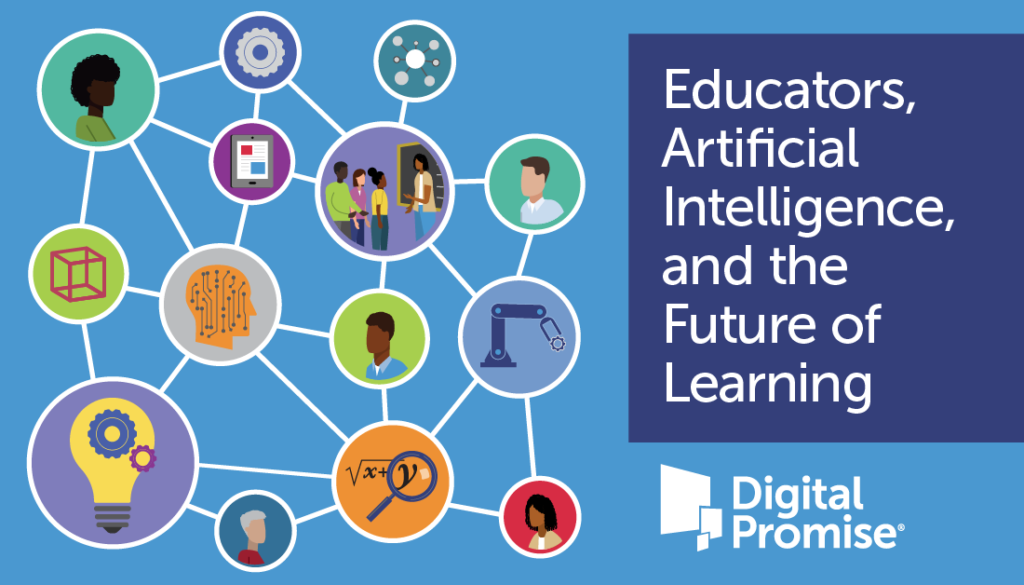By Pati Ruiz and Kip Glazer
Watch the recording.
On Tuesday, March 23rd we (Pati and Kip) participated in the Educators, Artificial Intelligence, and the Future of Learning webinar facilitated by Tamara Sumner. The webinar was designed to help practitioners, AI researchers, and developers learn more about each other. The panelists included:
- Debra Russell, Head of Engagement, TeachFX
- Sherice Clarke, Assistant Professor, UCSD
- Pati Ruiz, Researcher & Former School Administrator, Digital Promise
- Kip Glazer, Principal, San Marcos High School, Santa Barbara, CA
- Kelly Thomas, Teacher, Carver Elementary School, Newport News, VA
You can read their bios and review AI resources here. The topic of the webinar was, how AI can enhance teacher support?
The webinar started with Tamara Sumner, discussing the current gap between research and practice and also the current situation with COVID. Then each panelist shared their AI system or perspective on AI, teacher support, and the future of education. Two important topics came up in the webinar and we would like to discuss them a little bit more here. The first is the ethical implications of AI in the larger ecosystem of schools and classrooms. The other is our dreams for where AI can really support educators.
We acknowledge the immense benefit of AI when it comes to analyzing a large quantity of data efficiently to provide real-time feedback for a classroom teacher. Kelly Thomas, a Special Educator who is working with 3rd through 5th graders, shared her positive experiences of using TeachFX with her students. She expressed her appreciation of TeachFX, which has allowed her to quickly compare the amount of teacher-talk versus student-talk. She particularly loved being able to quickly and easily determine what types of questions generated the most student engagement, something TeachFX can easily provide with the use of AI. Sherice Clarke shared the way that her research, ClassInSight, allows color-coded visualization of science teaching and learning to expose the underlying pedagogy at play in the classroom. ClassInSight’s AI-generated visuals allow both classroom teachers and researchers to pinpoint where the most effective instructional practices exist during a class. (See Poster 9 in this document for more information about ClassInSight.)
Both ClassInSight and TeachFX have strict privacy policies to safeguard student and teacher privacy. This is something that all educators should be asking companies for. During the webinar, both of us raised concerns as to who has access to what data. In particular, we are concerned about how student and family data is being treated as a commodity and being sold to AI companies who are using these data for surveillance purposes. We were also concerned about such a technology being “weaponized” against teachers rather than assisting and guiding teachers to improve their instructional practices. Even without AI, student achievement data devoid of important context such as students’ socioeconomic status or previous trauma in the community has been used by some school leaders and policy makers to deride a group of teachers and contribute to the negative narrative against the teaching profession. Because AI makes it much simpler and easier to collect and analyze data, we must take care to create a clear understanding among all who are involved in the collection of such information.
When privacy policies are not in place (or not enforced), student data being collected can potentially be used to create additional knowledge gaps among our learners and perpetuate inequities among our students who have been traditionally minoritized due to the existing digital divide. We also believe that school leaders and policy makers must act to protect student privacy by creating additional safeguards as to who has access to the data, how long they can keep it, and for what purpose it can be used. Not only does this information need to be clear and disclosed upfront, but there also needs to be accountability and oversight into how companies are maintaining and using this information.
Because we are passionate about AI and its future, we want to ensure that the product developers who are able to gain entrance to our classrooms are following a set of ethical guidelines that ensure that our children’s futures are not unscrupulously commercialized and monetized. We believe that we can only create a world where that is possible by involving teachers and administrators from start to finish as AI-enabled tools are developed. Such involvement of all stakeholders will help demystify the technology that teachers are bringing into their classrooms and make it easier to evaluate the true effectiveness of all AI-enabled tools being used in the classroom.
Thank you to Erin Walker for reviewing this post. We appreciate your work in AI and your work to bring educators and researchers together on this topic.
Educator CIRCLS posts are licensed under a Creative Commons Attribution 4.0 International License. If you use content from this site, please cite the post and consider adding: “Used under a Creative Commons Attribution 4.0 International License (http://creativecommons.org/licenses/by/4.0/).”
Suggested citation format: [Authors] ([Year]). [Title]. Educator CIRCLS Blog. Retrieved from [URL]

